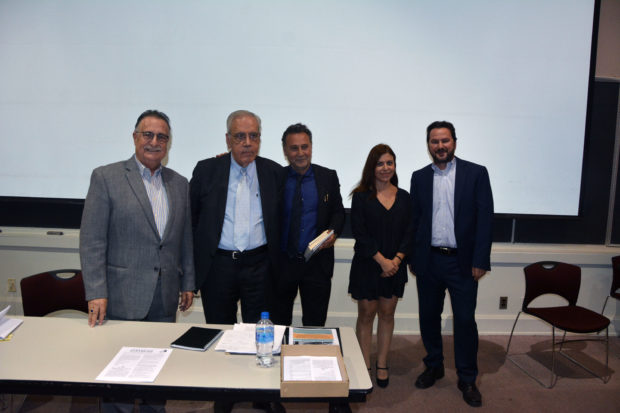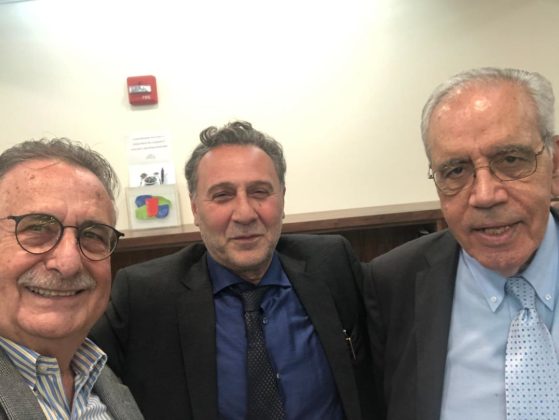- George Marcus, Greek-American Philanthropist & Entrepreneur
- “New Shoes!” American postwar humanitarianism in the papers of Anna Howell Hayward (1908–2001)
- ΘΕΙΑ ΦΩΤΩ (AUNT PHOTO) AND HER OXI
- Demi Lovato finds her inner ‘Child Star’ voice with new Hulu documentary
- Hellenic Film Society Closes Out a Successful Run of NY Greek Film Expo 2024
Reigniting Hellenic Spirit: Kazantzakis Literary Symposium
by Chris Salboudis
On October 8th, 2019 Kazantzakis enthusiasts took New York by storm at the 2019 Kazantzakis Literary Symposium, an event collaboratively prepared by various organizations dedicated to the preservation and advancement of the Hellenic community, past, present and future. The Symposium took place at Queens Hall, CUNY Queens College, which is home to the Hellenic American Project’s new Center.

The speakers. From left, Emmanuel Velivasakis, Georges Stassinakis, Nicholas Alexiou, Despina Afentouli and Dean Efkarpidis
Canonical Greek philosophy and literature has laid the foundation for the development and flourishing of western thought, culture and civilization. Nikos Kazantzakis is truly a titan in Modern Greek Literature and Philosophy, having written and published a variety of essays, memoirs, novels, poems, plays, travel books and other pieces that are still preserved and discussed today, both in the classroom and beyond. He is perhaps most famously recognized for the popularly-acclaimed novels and films, Zorba the Greek (published 1946, film release 1964) and The Last Temptation of Christ (published 1955, film release1988). Kazantzakis was the recipient of numerous awards and commendations, including the International Peace Award (1956, Austria) and a notable nomination by the Society of Greek Writers to receive the Nobel Prize for Literature (1946), which he lost to Albert Camus by only one vote – which Camus himself publicly declared to be unfair given the remarkable international impact of Kazantzakis work. It was also thanks to systematic sabotage on behalf of the official Greek state that Kazantzakis’ candidacy for Nobel was not duly promoted.

Emmanuel Velivasakis, Nicholas Alexiou and Georges Stassinakis
Contemporary scholars and commentators broadly state that both works show aspects of post-war Greek culture to reveal the raw perspectives on nationalism, politics, religion, and cultural traditions. The deepest beauty of his work comes from the distinctive revelation that Greece – both geographically and conceptually – does not belong strictly to the East or the West but to the world, the starting point of a valiant legacy that moves beyond all times to speak to our hearts, feed our souls, and keep us moving forward despite adversity and desolation in the face of increasing complexities of the real world. It represents the inescapable truths of humanity. The works of Kazantzakis recognize this and reflect the delicate balance between heart, mind, spirit and body in a way that has always reached his readers.
In Crete, a permanent museum was created to preserve Kazantzakis’ library and manuscripts. At the global level, countless exhibitions and symposia are regularly organized by a variety of foundations and scholarly institutions.
The 2019 Kazantzakis Literary Symposium was primarily inspired by the mission of Cultural Crete USA (culturalcrete-usa.org) to preserve and promote art, culture and community spirit through charitable and educational activities. With this in mind, Founding Director Emmanuel Velivasakis opened an international dialogue between the contributing members of the event and offered to serve as primary sponsor.
The goal was at once to celebrate the famed author, to showcase various institutions dedicated to the preservation and advancement of the Hellenic community, and to allow those assembled the opportunity the unique lecture of internationally-renowned scholar, Georges Stassinakis, Knight of the National Order of Merit of the French Republic, author of numerous publications, editor of the annual review Le Regard Crétois and Founding President of the International Society of Friends of Nikos Kazantzakis. In an exclusive interview following the event, Mr. Velivasakis shares, “Nikos Kazantzakis’ writings and philosophy shaped my own persona and my thinking as a young adult. It is my honor and duty to be able to assist in promoting his works and philosophy as an adult. And I do it with joy and gusto!”
Mr. Velivasakis enlisted the Executive Board of the Philo4Thought Hellenic Mentoring Initiative to manage administrative coordination for the Symposium and collaboratively arranged all conceptual and creative aspects of the event with Prof. Nancy Biska, Journalist and Adjunct Professor of Modern Greek Language & Culture at St. John’s University, Mr. Dean Efkarpidis, Writer and Board Member of the Greek Cultural Center and Prof. Nicholas Alexiou, Founding Director of the Hellenic American Project and Professor of Sociology at CUNY Queens College.
When asked why Kazantzakis is still relevant to the 21st Century, Prof. Biska states, “Nikos Kazantzakis was the most translated Greek writer, poet and philosopher of the twentieth century and truly transcended the boundaries of his own country to reveal a literary talent of ecumenical range and resonance that will still touch souls today. His work is truly timeless and constitutes an inexhaustible source of wisdom that will always reach and inspire. It is our obligation to pay homage to this great thinker by hosting events like this and to keep sharing his work with the new generation at colleges and universities.”
The Greek Cultural Center fosters opportunities for creative expression, cultural flourishing and educational programming to explore Hellenic roots and traditions and raise awareness about our Hellenic roots. In light of this mission Mr. Dean Efkarpidis recruited the assistance of Dr. Despina Afentouli, Journalist and Sociologist, to prepare an original dramatic contribution to the Symposium. In an exclusive interview, Mr. Efkarpidis shares, “The Greek Cultural Center could not stay away from an opportunity to celebrate and honor this Giant of contemporary Greek thought…. Nikos Kazantzakis is as relevant today as the writings of Sophocles & Euripides, Socrates’ dialectical method, the ideas of Plato & the sciences of Aristotle. He got there by doing what the ancients did: he studied, he learned, he examined, he synthesized. From this he crafted characters through which he dramatized and explored many philosophical issues: Good vs evil, flesh vs spirit, slavery vs freedom… these and other themes are laid out in front of readers in his expert hand – not to choose, but to wonder along with him.”

Over 200 students, scholars and cultural enthusiasts from across the tristate area and beyond gathered to attend the Symposium. The evening opened with an introductory commentary by Prof. Nicholas Alexiou on Kazantzakis “Odyssey” followed by Mr. Velivasakis presentation on Kazantzakis’ life and work and Mr. Stassinakis Keynote Address, “Nikos Kazantzakis and the Spirit of Hellenism.” The Symposium ended with Mr. Efkarpidis’ and Dr. Afentouli’s recitation of their dramatic composition, “Famous Quotes of Kazantzakis” (https://youtu.be/nsYD3EXQwME). A lovely reception followed, celebrating the official launch of the Hellenic American Project’s new Center as well as the successful event.
At the conclusion of the Symposium, Prof. Alexiou shared: “Our event presented contemporary insight on Kazantzakis as an Ambassador of Hellenism as well as a poet. I would like to thank all the sponsors and organizers who volunteered their time and resources in making it a success. I would also like to thank those who attended the event and visited the Hellenic American Project’s Archive, Library & Museum here at Queens Hall. We plan to host events of similar scope and interest in the coming months, providing opportunities to learn about the Greek immigrant experience and to browse the archival material we have procured.”
The extensive local, regional and national support of this type of event helps keep the Hellenic legacy alive, sets an example for future generations and creates new opportunities to make our community stronger. To date, the event has received very positive feedback for reigniting an interest in Kazantzakis and other great scholars. It has also inspired discussions to enhance the efforts of New York City’s Chapter of the International Society of Friends of Nikos Kazantzakis.















0 comments